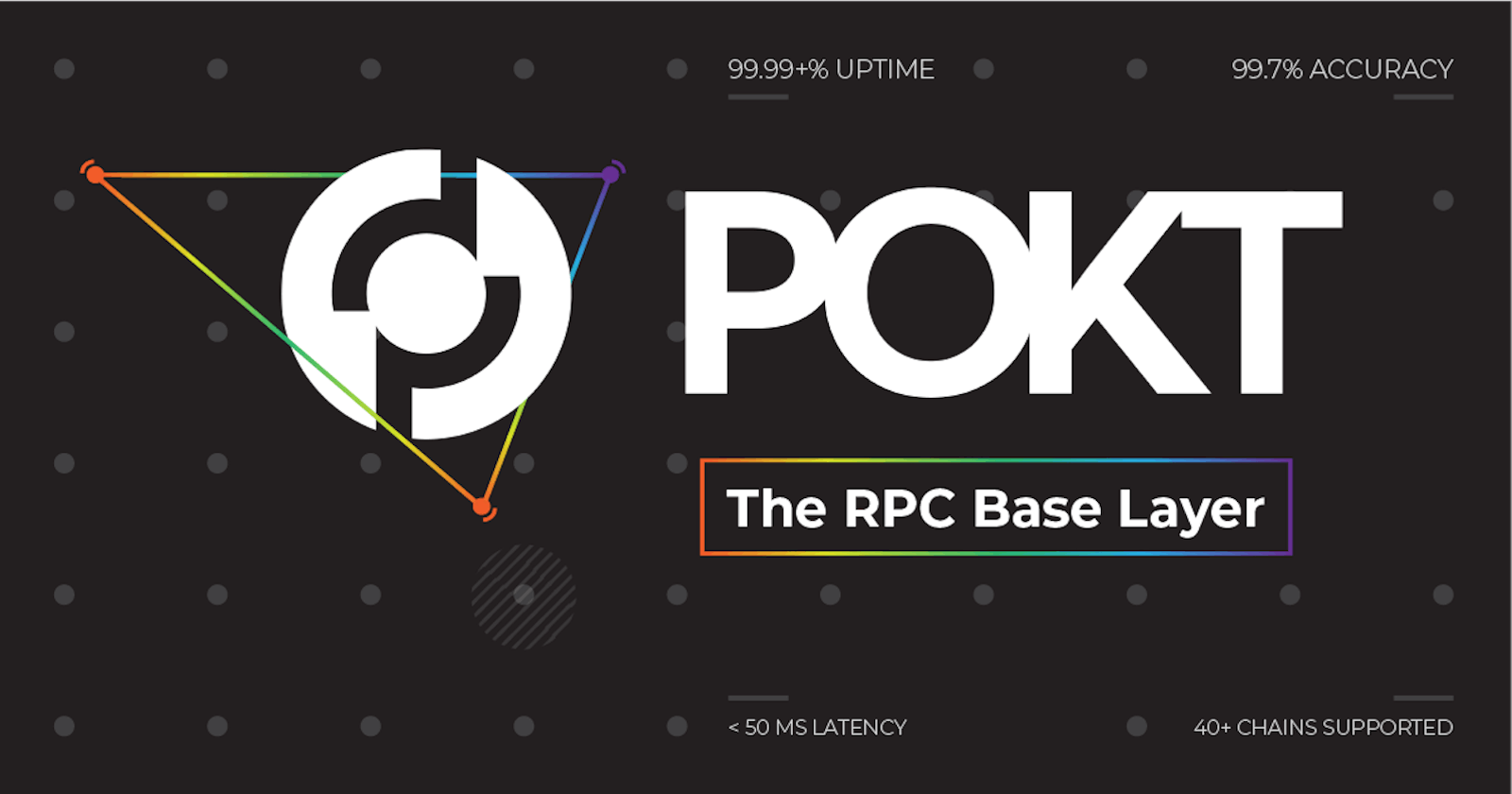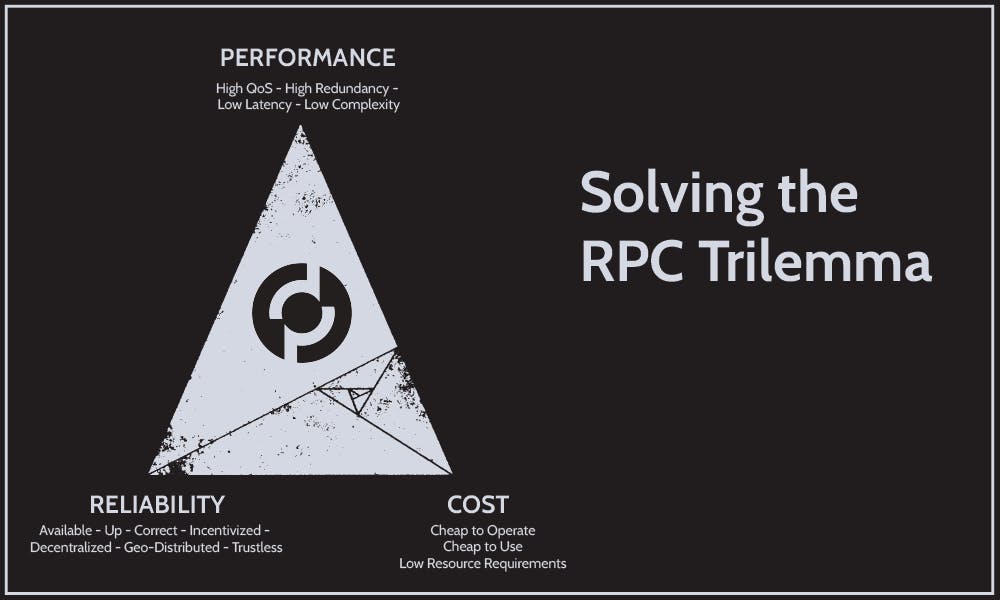Understanding POKT Network: A Comprehensive Guide to Decentralized RPC Services
There are several RPC (Remote Procedure Call) Providers to choose from: Alchemy, Infura, Ankr, Quicknode, POKT, and more.
So, why choose POKT?
What makes it different?
Let's dive into the many differences as to why you would choose POKT Network over other providers.
Intro to POKT Network & RPC Providers
POKT Network is a decentralized infrastructure that acts as a middleman between blockchain data and the applications that need it.
Imagine it like a bridge:
On one side, you have various blockchains overflowing with valuable information, like transaction history, smart contract code, and token balances.
On the other side, you have developers building the future of Web3 with decentralized applications (dApps). These dApps rely on accessing specific data from multiple blockchains to function properly.
However, there's a gap between these two worlds. Blockchains are complex and accessing their data directly can be challenging, especially for developers working with multiple chains.
This is where POKT Network comes in. It builds the bridge with two key components:
Relay Network: Independent node providers run software ("relays") that connect to various blockchains. These relays act like toll booths, fetching and verifying data on demand.
Decentralized Marketplace: Developers can access needed data by paying node providers with POKT, the network's native token. This creates a peer-to-peer marketplace for blockchain data, free from centralized control.
Benefits of using an RPC Provider
There are many benefits to using an RPC provider, making them a popular choice for developers working with blockchains and other distributed systems. Here are some key advantages:
Simplifies Development:
Abstraction: RPC providers hide the complexities of network communication and remote procedure calls. Developers can focus on writing code to utilize the requested data or functionality without worrying about the underlying infrastructure.
Standardized APIs: Most providers offer well-documented APIs that simplify interacting with various blockchains or services. This saves developers time and effort compared to building their own communication protocols.
Reduced Codebase: Utilizing RPC calls promotes code reuse and avoids the need to develop and maintain individual node infrastructure, keeping your codebase cleaner and more manageable.
Improved Performance and Scalability:
High Availability: RPC providers often have geographically distributed infrastructure, ensuring high uptime and redundancy compared to running your own node. This translates to reliable access to data and services even during outages or high traffic.
Faster Response Times: Many providers invest in optimizing their infrastructure for low latency and fast response times, crucial for real-time applications and performance-sensitive interactions.
Scalability: Providers can readily adapt to increased demand by scaling their infrastructure dynamically, eliminating the need for developers to manage node scaling themselves.
Cost-Effectiveness:
Pay-as-you-go: Most providers offer flexible pricing plans, allowing developers to pay only for the resources they use. This can be significantly cheaper than running and maintaining your own nodes, especially for projects with fluctuating data needs.
Reduced Hardware Requirements: Using an RPC provider eliminates the need for dedicated hardware to run your own nodes, saving on upfront costs and ongoing maintenance.
Additional Benefits:
Security: Many providers offer advanced security features like DDoS protection and intrusion detection, enhancing the security of your application's interactions with the blockchain.
Feature-rich Services: Some providers offer additional features like analytics, transaction history monitoring, and node management tools, providing valuable insights and simplifying development processes.
Community and Support: Many providers have active communities and dedicated support teams, offering assistance and troubleshooting resources for developers encountering issues.
However, it's important to remember that some potential drawbacks also exist:
Centralization Concerns: Using a centralized RPC provider introduces a potential single point of failure and raises concerns about censorship. Decentralized RPC providers like POKT aim to address these concerns.
Vendor Lock-in: Relying on a single provider can create vendor lock-in, making it difficult to switch providers later. Choosing a provider with robust APIs and open standards can mitigate this risk.
Security Risks: Choosing a reputable provider with strong security practices is crucial to ensure the safety of your applications and data.
Overall, the benefits of using an RPC provider often outweigh the drawbacks for most developers. Weighing your specific needs and priorities against the available providers will help you choose the best option for your project.
What Sets POKT Network Apart From Other RPC Providers?
The RPC Trilemma
The RPC Trilemma is a fundamental challenge faced by developers building applications that rely on blockchain data. It posits that achieving all three of the following goals is near-impossible:
Performance: Fast response times and high throughput for data requests.
Reliability: Consistent availability and uptime of the data source.
Cost: Affordable, scalable pricing for data access.
Traditionally, developers have faced trade-offs when addressing these goals. Centralized RPC providers might offer better performance and reliability, but often at the expense of higher costs and potential censorship concerns. Conversely, decentralized alternatives can be more cost-effective and censorship-resistant, but sometimes struggle with achieving consistent performance and uptime.
This is where POKT Network comes in, claiming to navigate the RPC Trilemma through its unique, community-driven approach:
Performance: POKT leverages a network of independent node providers ("relays") distributed across the globe, aiming to reduce latency and increase data accessibility. The competition between relays incentivizes them to optimize their infrastructure for faster response times.
-
Reliability: The P2P network architecture provides redundancy and resilience. If one node goes down, others can pick up the slack, minimizing downtime and ensuring consistent data availability.
Cost: POKT utilizes a token-based payment system, allowing developers to pay only for the data they consume. This eliminates upfront fees and scales naturally with usage, promoting affordability.
Additionally, POKT addresses the Trilemma through:
Community-driven governance: Token holders participate in network upgrades and feature development, ensuring the platform evolves to meet user needs and optimize performance, reliability, and cost.
Open-source code: Transparency fosters trust and allows developers to contribute to the network's optimization and improvement.
-
Multi-chain compatible: POKT is actively integrating other blockchains to cater to developers building cross-chain dApps, currently boasting support for 40+ different blockchains including: Ethereum, Polygon, Arbitrum, Binance Smart Chain, Optimism, Solana, Starknet, and many more. Check out the POKT's supported chains list here: https://docs.pokt.network/supported-chains
POKT supports RPC services for 40+ different blockchains, including: Ethereum, Polygon, Arbitrum, Binance Smart Chain, Optimism, Solana, Starknet, and many more...
- Customization options: Developers can choose specific node providers and configure their requests for optimal performance and cost efficiency.
Does POKT Network Provide Free RPC Services?
Yes, with the ability to create two apps and mint an unlimited number of endpoints for free. No Credit Card Required.
Here's how it works:
Free Tier Features:
Create up to two applications: Spin up separate projects and experiment with different data needs.
Mint unlimited endpoints per application: Craft as many data access points as your applications demand within the free tier.
250,000 free relays per day: That's a substantial amount of data requests to play around with and build basic functionalities.
No credit card required: Jump right in and start exploring without any upfront commitment.
Beyond the Free Tier:
Once you've outgrown the free tier's limits, POKT's Pay-as-you-go (PAYG) system seamlessly takes over. You'll only pay for the data requests your applications actually generate, ensuring cost-effective scaling for your growing needs.
Here's what PAYG offers:
Transparent billing: Pay a tiny fraction of a cent per additional relay beyond the free tier.
Monthly invoices: Keep track of your data usage and costs clearly.
No overage charges: Never worry about unexpected bills, thanks to the predictable PAYG model.
Whether you're a seasoned developer or a curious newcomer, POKT Network's free tier and flexible PAYG system make exploring blockchain data accessible and affordable. Dive in, experiment, and unlock the possibilities of a decentralized data future!
Additional Resources:
POKT Network Documentation: https://docs.pokt.network/get-rpcs/public-endpoints
POKT Network Blog: https://www.pokt.network/blog/pay-as-you-go-explained
Wrapping Things Up:
For aspiring dApp architects, POKT Network is an open invitation to the future of web3. Its decentralized marketplace for blockchain data fosters freedom and empowerment, offering a refreshing alternative to centralized, siloed models. Start building without breaking the bank with a generous free tier and a transparent pay-as-you-go system, scaling seamlessly as your dApp takes flight. Unleash your creativity with unlimited endpoint creation, crafting tailored data pipelines for your unique vision. Embrace community-driven governance and shape the future of a censorship-resistant data landscape. Join the vibrant POKT Network ecosystem and build dApps that truly break the chains, all powered by the transparency, cost-effectiveness, and security of a thriving decentralized infrastructure. POKT isn't just a data provider, it's a passport to a more open, accessible, and equitable web3 world.
Start building today and become a pioneer in the data revolution!
For more detailed information on POKT Network, visit their official website and the POKT Network Documentation.




